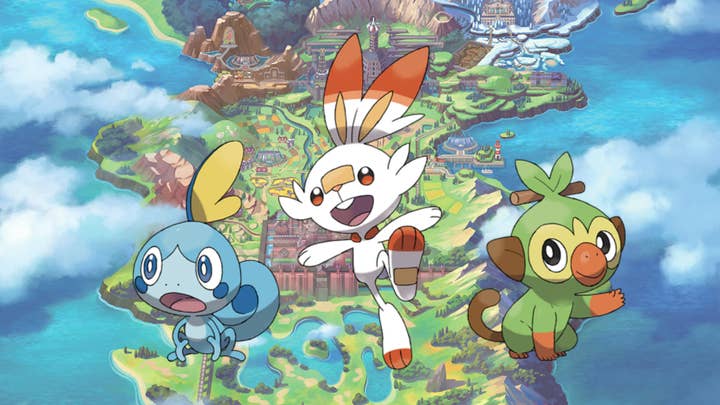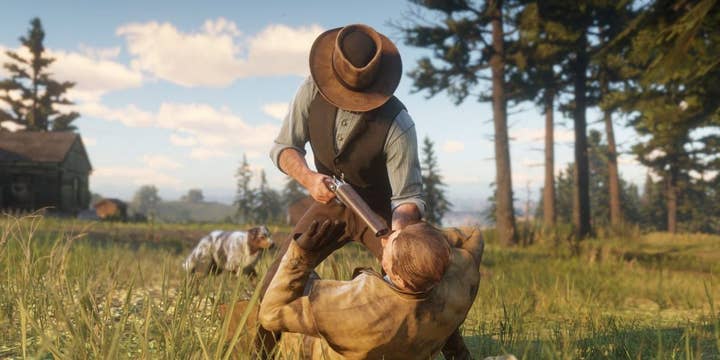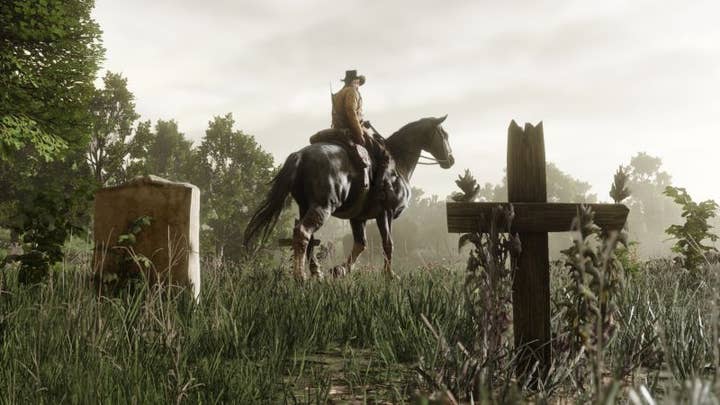Is Red Dead Redemption Online tanking Take-Two's share price? | Opinion
Despite fantastic sales, Take-Two can't catch a break - perhaps because investors expected RDR2 to be something it simply isn't
By any reasonable standards, Red Dead Redemption 2 is a runaway success. 23 million copies of the game have been shipped to retailers, as of Take Two's earnings call at the start of February, making it into one of the best-selling games of the generation after only a few months.
With a hugely positive critical response likely ensuring a long tail for the game, it's overall a very solid achievement from a commercial perspective, as well as a creative one. Nevertheless, shares in Take Two have declined by 30% since the game launched at the end of October; part of an overall malaise in video game shares, certainly, but all the more remarkable since the successful launch of RDR2 and its subsequent sales performance barely even moved the needle.
"Look at the financial press and you find yourself reading about a different RDR2 -- one intended to inherit the gilded legacy of GTAV... the long tail to end all long tails"
If you're an employee of Take Two (or an investor holding their shares) you might reasonably find yourself shaking your fists in the general direction of Wall Street and asking what on earth it is that these people actually want. If doing an outstanding job of developing and publishing a major video game isn't what the stock market wants to see a developer and publisher of video games doing, then what precisely would actually make them happy? To the extent that this is part of a broader pattern which is merely dragging Take Two along for the ride -- with investors spooked by everything from the success of Fortnite to the impending turnover in the console hardware cycle -- the answer is probably "not much".
There is, however, something else going on here too. Often when a stock underperforms, it's because investors actually wanted the company to be doing something else entirely and thus they don't really care how effectively and profitably the firm is doing elsewhere, so long as it's not doing the thing (real or imagined) they thought it was going to.
The perfect example of this in the games business in recent years is Nintendo -- which regularly sees its stock price take a tumble just after doing Nintendo Direct online announcements of major games for the Switch. This week was no exception, with Nintendo's stock down after the announcement of Pokemon Sword and Shield. Why? Well, it's reading tea leaves a little, but the most rational explanation is that many of Nintendo's investors are obsessed with the firm's performance in smartphone games; they came on board with the stock when the firm announced its intentions to publish on smartphones and continue to see it essentially as a smartphone gaming related investment, so every major announcement that doesn't contain something about smartphone games sends a spike of disappointment through the market.
Is this flat-out ridiculous given that Nintendo's core business is performing at levels similar to the Wii, but looking far more sustainable this time out? Yes, of course it is -- but that doesn't stop money from toppling off Nintendo's valuation every time it does a Direct event that isn't about smartphone games.

Take Two is almost certainly suffering from a dose of the same malady -- but in this case it's not smartphone gaming that's the problem. Rather, it's online gaming and the enormous expectations created among investors around RDR2's online mode. Now, you may be thinking that the online mode for RDR2 -- an epic, sprawling western that's fuelled by its narrative-driven single player mode -- isn't a particularly big deal for most players of the game, and you'd be right. I'm not sure I know anyone who bought RDR2 who was particularly excited about playing the game online, and I know plenty of people who were wildly excited about the game overall.
Online play was discussed in previews and press coverage, of course, but it felt like something of an aside; this is first and foremost a gigantic achievement in "cinematic", narrative-led gameplay, at least as far as consumers and the specialist press are concerned. Look at the financial press, though, and you might find yourself reading about a very different RDR2 -- a game which is intended to inherit the gilded legacy of GTAV, not just in terms of its epic environments and tightly plotted narratives, but in terms of the online component which turned GTA's latest instalment into a years-long phenomenon, the long tail to end all long tails.
"Just having a slightly differently tailored set of leather chaps isn't going to make people want to fork over cash -- you need to let them have items which make them feel unique and special and lets them stand out in the world."
If that's what you expected RDR2 to be -- and that's what the financial press, some analysts and perhaps even the odd bit of misplaced excitement from executives themselves have been leading investors to believe it would be for some time -- then the tens of millions of sales the game has racked up so far are almost inconsequential.
You're looking for a slice of a years-long, console generation spanning business that'll snowball its software sales out for month after month and draw players back to buy premium currency bundles again and again. If you're a consumer, you may be feeling like that really doesn't describe RDR2 as you know it; if you're an investor, the 30% drop in TTWO since the launch of the game suggests that you might be coming around to that understanding as well.
Take Two, for its part, does now seem to be focusing a fair bit of energy on the online aspect of the game -- but one wonders if it's not flogging a dead horse (which, incidentally, would be very on-brand as an in-game activity). There's very little to suggest that RDR Online has sparked interest among players in the way that GTA Online did; what few posts one can find about the online mode on popular gaming forums lately seem to revolve around complaints that Take Two's updates seem (at least to players' eyes) to be focused on tweaking the in-game economy to make paying for things with real money more appealing at the expense of earning currency through in-game activities. It's hard to confirm that that's what's really happening -- player communities tend to react suspiciously to any in-game economy changes -- but it's certainly not the kind of tweaking that speaks of a company that's aiming to broaden the appeal of its game's online aspect, despite the effort being put into continuing its development.
Ordinarily that wouldn't merit a shrug, but the heightened expectations around RDR Online from investors complicate matters significantly -- failure to launch for this aspect of the game could damage TTWO's market position far more than actual consumers might reasonably imagine. Ironically, the explanation that will likely be trotted out in the financial press -- yet another major title brutally fragged by Fortnite's god-mode rampage through the landscape -- may actually be right, albeit for entirely the wrong reasons. RDR2 is in fact a perfect example of how Fortnite really isn't hurting the games industry; it launched at the peak of Epic's battle royale title's popularity and yet it racked up 15 million sales in only a week or so.

On the other hand, Fortnite's success as an online game gives us an interesting point of comparison with the relatively damp reaction to RDR Online -- especially when we put GTA Online into the comparison grid alongside them. These are, of course, very different games -- but there's a very clear point of overlap between GTA Online and Fortnite which has little to do with gameplay and everything to do with aesthetic.
Both of these games sport a graphical style and an intrinsic that allows for a huge range of player expression bordering on the anarchic. They're both games which straddle carefully over the dividing line between the sublime and the ridiculous; GTAV's peculiar style allows for a "gritty" criminal world in which silly, brightly coloured costumes, weapons and vehicles still fit perfectly, while Fortnite's cartoonish style is ideally tailored to that kind of expression from the outset.
Why is that important, and what does it tell us about the "disappointing" (to some) response to RDR Online? Here's the thing; in almost every major online game of the moment, the "endgame", such as it is, is essentially all about player customisation and self-expression. For that to work, you need a game whose style lends itself to that kind of expression. Just having a slightly differently tailored set of leather chaps isn't going to make people want to fork over cash -- you need to let them have items which make them feel unique and special and lets them stand out in the world.
That's something a lot of games fail to do; RDR2 is a strong example, with its aesthetic and style, while perfectly suited to the narrative-led single player, being itself largely inappropriate for the kind of motivation that actually fuels engagement and revenue in this kind of online title. It's hardly a problem unique to RDR2 -- I suspect that Apex Legends, though less realistic in general so a solution could arguably be found, is going to run into similar problems in getting people to pay for its rather by-the-numbers customisation options.
Of course, the more fundamental problem is that there's a whole sector of the business world that's judging RDR2 by a metric which should never have been considered a key aspect of its performance and comparing it against a predecessor that was vastly different in a host of ways. Nonetheless, if we're going to look at the thus far muted response to RDR Online, it's instructive to think of it not from a cosmetic perspective as well as a gameplay perspective. Beauty may only be skin deep -- but people dive pretty deep into their wallets in its service, which is a lesson anyone wanting to make money from online games would do well to take to heart.

